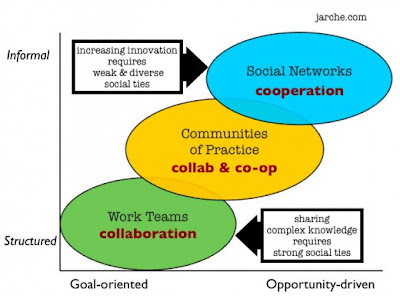Harold Jarche defines personal knowledge management (PKM) "as a set of processes, individually constructed, to help us make sense of our world and work more effectively".
In a nutshell, PKM enables us to pull our learning to match the specific knowledge demands encountered at work. PKM can be viewed as a 3 stage process where we seek out relevant information, we make sense of it in the context required and share it with our network to test it, refine it and then apply this as knowledge on the job.
Harold Jarche has made a significant contribution to the application of PKM and you may like to explore the resources available at http://www.jarche.com/category/pkm/.
I've previously discussed the value of PKM in the context of agile learning for the workplace. In this post I'd like to consider PKM as a vehicle for attaining professional confidence.
Self-belief or Self-Efficacy was defined by Albert Bandura as the belief in one's capabilities to organise and execute the courses of action required to manage prospective situations.
Does personal knowledge management (PKM) enable us to walk the fine line between self-belief and self-doubt? Is PKM the key to growing into our jobs - excelling and developing expertise - but also a sense of mobility and confidence to create a fulfilling career?
In a nutshell, PKM enables us to pull our learning to match the specific knowledge demands encountered at work. PKM can be viewed as a 3 stage process where we seek out relevant information, we make sense of it in the context required and share it with our network to test it, refine it and then apply this as knowledge on the job.
Harold Jarche has made a significant contribution to the application of PKM and you may like to explore the resources available at http://www.jarche.com/category/pkm/.
I've previously discussed the value of PKM in the context of agile learning for the workplace. In this post I'd like to consider PKM as a vehicle for attaining professional confidence.
Self-belief or Self-Efficacy was defined by Albert Bandura as the belief in one's capabilities to organise and execute the courses of action required to manage prospective situations.
Does personal knowledge management (PKM) enable us to walk the fine line between self-belief and self-doubt? Is PKM the key to growing into our jobs - excelling and developing expertise - but also a sense of mobility and confidence to create a fulfilling career?
When I say 'expertise' I'm talking about bringing your existing knowledge to new situations and having the capacity to adapt this to match the specific circumstances. How successful you are in meeting the challenges helps you expand your knowledge and provides a platform to take on new projects and different jobs. This to some extent is a product of learning experiences that enhance your sense of self-belief.
This ability to solve problems and create solutions also relates to Dan Pink's notion of what drives motivation - autonomy, purpose and mastery. I think motivation also has a synergy with an individual's sense of self-belief or professional confidence and how comfortable they become with a degree of autonomy.
Returning to personal knowledge management, Harold Jarche's Seek-Sense-Share model contains an element of critical thinking and personal self-directed learning, supported now by an array of web-based tools.
However, it's the ability to share and engage in dialogue that provides the link to practice. In other words, connection with others across networks is the real key to contextualising your knowledge and facilitating innovation.
I've touched on aspects of PKM that build and support our sense of self-belief, our self-efficacy. Firstly, the PKM framework provides us with a relatively systematic approach for addressing new challenges or performance improvement. Secondly, by making connections and expanding your networks there's a means of getting a 'best-fit' solution. Further, the corroboration of others brings peace of mind and confidence that you're getting it right. Ultimately of course this also needs to be reflected in the business metrics!
"People with high assurance in their capabilities approach difficult tasks as challenges to be mastered rather than as threats to be avoided." - Albert Bandura



